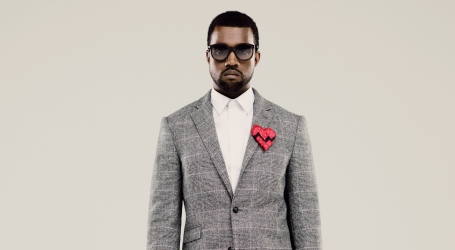 With the temperature dropping, it's time to find someone to keep you warm. Find your hookups with our online dating guide!
With the temperature dropping, it's time to find someone to keep you warm. Find your hookups with our online dating guide!
808s & Heartbreak
- Pop
- 2008
- Buy the CD
Reviewed by Jeff Giles
()
These days, the difference between a major hit, a minor success, and a flop is razor-thin; when even a huge debut like Taylor Swift’s Fearless can bring in fewer than 500,000 units and still take the title for biggest first-week sales for a country album in 2008, it’s clearer than ever that we’ve traded superstars for a succession of transient celebrities who lack the power to hold our collective attention long enough to truly entertain us. Which is where Kanye West’s 808s & Heartbreak comes in: you see, West isn’t a superstar, but he believes he is, and that’s part of what gave him big enough balls to record this album – one of the oddest, bravest releases from a top-selling major-label artist in recent memory. If this record had come out 20 years ago, it would be a phenomenon, if for no other reason than that people wouldn’t be able to stop talking about it. As it is, 808s will raise a few eyebrows, roll a few eyes, shift some units, and recede into distant memory by next year.

It’s a shame – sort of. The thing is, as brave an album as this is, it isn’t a great one, or even a particularly good one, on its own strictly musical merits. But it sure is fascinating.
Here’s the back story: West has, in the last year, lost his mother to unexpected complications resulting from cosmetic surgery, as well as suffered the (apparently ugly) demise of an engagement. In pretty much any other genre, these events would be grist for at least one album of probing, confessional material, but Kanye West is a rapper, and mainstream hip-hop has never made much room for that sort of thing. Had he chosen to go that route, West surely has enough clout to change that – to produce the hip-hop version of Blood on the Tracks, if you will – but he decided to go another direction completely. Where West’s previous efforts have been rap albums that incorporated a lot of pop elements, 808s & Heartbreak is a pop album that happens to feature a little rapping. A very little rapping, actually.
Up ‘til now, West’s sonic palette has been proudly limitless, drawing a little bit of everything across genres and borders, but for 808s, he’s chosen to limit himself to beats crafted with the classic Roland TR-808, vintage (or at least vintage-sounding) synths, and Auto-Tuned singing. Yes, this is the same damn vocal gimmick you’ve heard on pretty much every R&B hit of the last year and a half, but in West’s hands, it’s used a little differently; where other artists bring it out to achieve a blingy futuristic party vibe, he relies on Auto-Tune as a way of adding an extra layer of chilly distance to the songs. It’s still irritating, but over the doomy New Wave synths and robotic beats, the effect is both more unusual and more sensible – it looks crazy on paper, but it’s a little like T-Pain fronting early Depeche Mode.
This sonic departure – from West’s past, from hip-hop’s established conventions – is what sets 808s apart. The songs? They’re fine. It’s tempting to wonder what might have happened if West had given his lyrics enough time to go through a few rounds of editing, but these verses largely betray their rushed origins. There’s nothing wrong with hurrying to keep up with your muse, of course, and West was clearly inspired when he recorded this album, but there are too many lyrical clunkers here (led by Young Jeezy’s cameo on "Amazing," where he spits "standing at my podium, I’m tryin’ to watch my sodium") to keep it from falling below the standard set by the music.
In the end, it’s difficult to decide how to analyze 808s & Heartbreak. West deserves tons of credit for branching out like this, and for putting together one of the most interesting major-label releases of the year – but if an album is interesting chiefly because of the way it steps outside genre lines, and the way it blends retro noise with new sounds, does that make it great, or merely a curiosity? Time will ultimately tell, but at least initially, it feels more like the latter. As a piece of pop culture, however, 808s might be the release of the year. Twenty years ago, you wouldn’t have had any choice but to hear it; the way things are now, you’ll probably have to make a few clicks of the mouse to seek it out. And that really is a shame, actually, because this album proves that name-brand artists can still take major risks, and for that, if no other reason, it deserves to be heard by as wide an audience as possible. As a collection of songs, 808s & Heartbreak is a solid three-star effort – but as a pop culture event, it’s a viable candidate for album of the year.
You can follow us on Twitter and Facebook for content updates. Also, sign up for our email list for weekly updates and check us out on Google+ as well.











